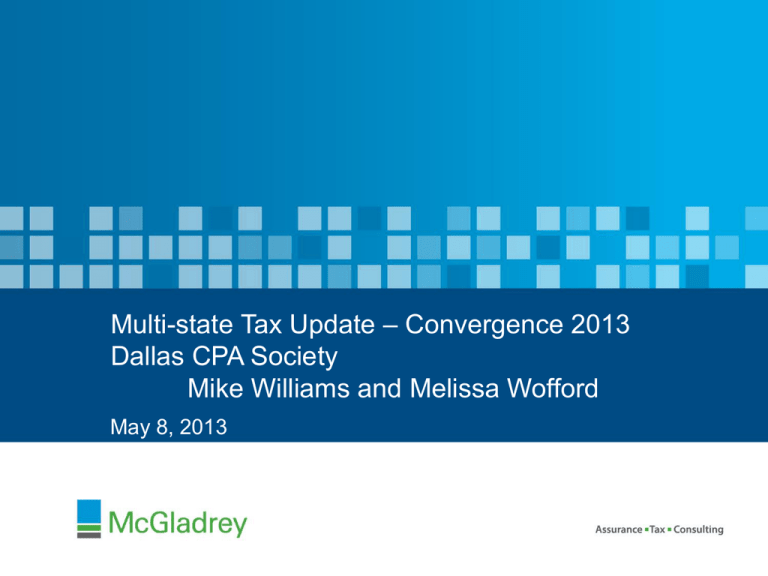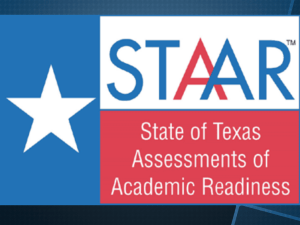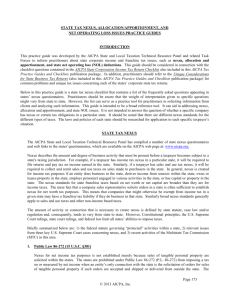Multi-state Tax Update
advertisement

Multi-state Tax Update – Convergence 2013 Dallas CPA Society Mike Williams and Melissa Wofford May 8, 2013 Income and Franchise Tax 1 Apportionment of sales other than sales of TPP Cost of Performance • Direct costs determined in a manner consistent with generally accepted accounting principles and in accordance with accepted conditions or practices in the trade or business of the taxpayer to perform the income producing activity which gives rise to the particular item of income. Included in the taxpayer’s cost of performance are taxpayer’s payments to an agent or independent contractor of the performance of personal services and utilization of tangible and intangible property which give rise to the particular item of income 2 Apportionment of sales other than sales of TPP Market sourcing of sales of services • • Receipts are attributed to where the services are delivered, and not where the services are performed In general, delivery can occur where the customer is located or where the benefit of the services are received 3 Apportionment of sales other than sales of TPP Cost of Performance Considerations • How are direct costs defined? • Should independent contractors be considered? • Indirect costs • GAAP • Marketing activities 4 Apportionment of sales other than sales of TPP - Recent cost of performance decisions • AT&T v. Comm (MA App. Ct. 2012) • JRS Distrib’n Co. v. Treasurer (MI Ct. of Appeals 2012) • Michiana Metronet v. Treasurer (MI Ct. of Appeals 2012) 5 Alternative Apportionment Uniform Division of Income for Tax Purposes Act (UDITPA) Section 18 • Mississippi – Equifax Inc. v. DOR • Tennessee - Vodafone Americas Holdings, Inc. v. Roberts • Indiana – Letter of Finding 02-20110473 • Illinois – IT-13-0001 6 Alternative Apportionment 3 Factor Challenges • California - Gillette • Michigan - IBM • Texas – Graphic Packaging 7 Current Trends Texas – Franchise Tax COGS – Comptroller revised revised rule for deductions Governor Perry’s proposals Legislative session set to conclude in May Flurry of lawsuits filed - 8 Current Trends Texas – Compensation Deduction Winstead PC v. Combs, No. D-1-GN-12-000141 Statute allows a taxpayer to deduct the cost of all benefits to the extent deductible for federal income tax purposes District Court found regulation exceeded the Comptroller’s statutory authority - 9 Current Trends California – Single sales factor All tax years after 1/1/13 requirement to apportion income using single sales factor for all apportioning businesses Partnerships – rule applies regardless of the form of ownership and unitary relationships Partnerships with non-resident partners should take this into consideration for ES/withholding - - 10 Current Trends California – attribution of nexus among partners SUP, Inc., Case No. 571262 (adopted Nov. 14, 2012) Nevada general partner in a Nevada partnership subject to CA min franchise tax A partnership is actively managed by its general partner at the location of the general partner and the activities of the partnership are attributed to a general partner Limited partner? - 11 Current Trends District of Columbia – Statute of Limitations Office of Tax and Revenue v. Sunbelt Beverage LLC; No. 10-AA-1331 OTR could not issue and assessment against a taxpayer three years after the taxpayer had filed a return on an incorrect form D-30 v D-65 The form filed by the taxpayer represented a good faith attempt to file a return and set forth the necessary information to correctly determine the amount due - - 12 Current Trends Kentucky – Intercompany Management Fees HB 440 (March 26, 2013)- passed the house waiting for signature Planning benefit Company could deduct from its corporate income tax base payments made to a related party for management services (e.g. accounting, payroll, insurance, data processing, etc.) - 13 Current Trends Louisiana - UTEL Com, Inc. and UCOM, Inc. tax cases. A holding company was not subject to Louisiana franchise tax because the company lacked a physical presence in the state The companies only presence in the state is by virtue of a limited partnership interest in a company conducting business in the state as a partnership March 2012, the Louisiana Supreme Court denied the review of these tax cases. - 14 Current Trends New Mexico – HB 641-Tax law changes Corporate income tax rate reduced from 7.6% to 5.9% over a five year period Beginning 2014, mandatory unitary combined filing requirement for retailers making retail sales of goods in a facility of more than 30,000 sq ft under one roof Elective single sales factor apportionment will phase in over five years for manufacturers - 15 Current Trends Oklahoma – corporate income tax capital gains CDR Systems Corporation v OTC, Case No. 109886 OK capital gains deduction unconstitutional OK companies were granted preferential treatment over non-OK companies in violation of the Commerce Clause - 16 Current Trends Multistate Tax Commission – Article IV Business/Non-business income Double-weighting of sales factor Definition of Receipts for sales factor purposes Sales other than sales of tangible personal property Alternative apportionment rules - - 17 State Amended Returns for RARs - No uniform state statutes/rules When are reporting deadlines – 30, 60, 90, 120, 180 or more Final determination date is critical Penalty and interest Documentation Expect notices! Other complications or complexities Plan, plan, plan 18 Series LLCs - A form of limited liability company that provides liability protection across multiple series each of which is theoretically protected from liabilities arising from the other series Federal Proposed Reg 301.7701(a)(5) State adoption Limitations Planning 19 Sales and Use Tax 20 Proposed Federal Legislation - Nexus Marketplace Fairness Act of 2013 • • • • Grants states authority to compel remote sellers (online and catalog retailers) to collect and remit sales/use tax The Act requires states to simplify their sales tax laws States are eligible to require collection by remote sellers by either: - Being SST member state - Implementing the Act’s minimum simplification requirements Small Seller Exception – applies to remote sellers with total gross annual revenue of less than $ 1 million 21 Click–through Nexus New York – “Amazon tax” - an out of state seller soliciting sales through an independent contractor, agent, or other representative if the seller enters into an agreement with a New York resident for a commission. - the representative directly or indirectly refers potential customers to the seller whether by link, internet website or otherwise (click-through nexus) - gross receipts total more than $10,000 22 Click-through Nexus Kansas approved legislation enacting clickthrough nexus on April 16, 2013 - goes into effect 90 days after enactment - a retailer is presumed to be doing business in the state when entering into an agreement with a Kansas resident for a commission - refers potential customers by: link, internet website, telemarketing, in-person oral presentation - cumulative gross receipts of $10,000/year 23 Click-through Nexus Georgia has passed legislation implementing click-through nexus on April 19, 2012 - has the same language as other states regarding using “click through” marketing using representatives in Georgia - exception: if gross sales from referrals by click-through is under $50,000 annually and attend trade shows solely for less than 5 days in Georgia 24 Cloud Computing - Overview • • • • • Software as a Service (“SaaS”) Application Service Provider (“ASP”) SaaS and ASP are new business models for software delivery (“cloud computing”) Software applications provided over the internet as a service rather than license of tangible personal property Allows customers to access software applications over the internet through a third party provider 25 Cloud Computing - Overview • Sales Tax Implications/Questions - does the provider have nexus? - is it a sale or license of canned software or performance of a service? - is the “true object” test applicable? - if a sale of service, is the service taxable? (information or data processing services) - if a sale of software, is it canned or custom software? 26 Cloud Computing – Recent State Rulings Idaho – HB 243 enacted on April 3, 2013 - provides that software accessed through the internet is not tangible personal property for sales/use tax purposes and therefore, is exempt Massachusetts – issues Working Draft Directive 13-XX on February 7, 2013 - if “true object” of transaction is access to software then transaction will be taxable. - if “true object” of transaction is to obtain a benefit of third party’s services then not taxable. 27 Cloud Computing – Recent State Rulings New Mexico – Ruling No. 401-13-1 (1/31/13) - out of state’s business’ sales of online software on subscription basis to users in New Mexico is taxable for gross receipts tax. - transactions were sales of intangibles sourced to location where internet was accessed - consulting and data analytic services performed outside New Mexico are exempt even if product initially used in New Mexico 28 Cloud Computing - Texas Cloud Computing Services: allows customers to access software and used on company’s servers through the cloud - customers are not required to use specific software nor download any software - no software license is sold or transferred - cloud computing billed based on usage - Taxable as data processing services which includes “computerized data and information storage or manipulation.” 29 Resale and Exemption Certificates Resale and Exemption certificates are getting looked at closer by state auditors Auditors verifying fully completed with correct information and wording States issuing specific registration numbers and/or certificates instead of blank forms (e.g., Texas agriculture exemption, Louisiana resale and manufacturing exemption forms) 30 Biography Mike Williams (972) 764-7025, mike.williams@mcgladrey.com Mike is the Dallas SALT practice leader for McGladrey LLP and serves in various leadership roles with the firm. Mike has over 19 years experience in public accounting with approximately 17 years experience in the state and local tax area. Prior to joining McGladrey LLP in October 2006, Mike spent 9 years practicing with a Big 4 accounting firm. He has assisted clients in the manufacturing, technology, retail, real estate, distribution, energy and service industries. Mike’s extensive experience includes Texas franchise tax consulting, restructuring implementations, voluntary disclosure agreement negotiation, merger and acquisition consulting, tax compliance management, refund reviews, nexus studies, state audit defense, and state income tax provision consulting. Professional Affiliations and Credentials American Institute of Certified Public Accountants (AICPA) Texas Society of Certified Public Accountants (TSCPA) State Taxation Committee of the Texas Society of Certified Public Accountant Texas Taxpayer and Research Association Louisiana Society of Certified Public Accountants Association for Corporate Growth Education Bachelor of Science in Accounting – Louisiana State University Masters in Business Administration – University of New Orleans 31 Biography Melissa Wofford (972) 764-7042, melissa.wofford@mcgladrey.com Melissa is a director in McGladrey LLP’s State & Local Tax Practice in Dallas, Texas. She specializes in sales and use tax consulting. She assists companies with their sales and use tax issues in all states, with a focus in Texas, Oklahoma, Arkansas, and Louisiana. Melissa has over thirteen years of experience in the state and local tax area working with a wide range of industries including manufacturing, food processing, retail, restaurant, distribution, service, oil and gas, financial institutions, healthcare, and entertainment. Examples of expertise in the state and local tax area include: audit defense, refund reviews, reverse sales and use tax audits, multi-state sales and use tax planning, managed audits and voluntary disclosure agreements Professional Affiliations and Credentials Certified Member of the Institute for Professionals in Taxation (CMI) Education BS in Accounting, Texas Tech University – Lubbock, TX 32










